Examining the Compatibility Between Slavery and Education: Proposal
VerifiedAdded on 2019/09/25
|9
|1463
|273
Report
AI Summary
This research proposal investigates the complex relationship between slavery and education, focusing on the historical context and its impact on African Americans. The paper begins with an introduction outlining the problem, followed by a review of relevant literature, including works by Frederick Douglass and other researchers who have examined the negative correlation between slavery and educational outcomes. The research will employ a methodology based on secondary sources, such as research papers and books, to explore the experiences of those affected by slavery and their educational aspirations. The findings highlight the incompatibility between slavery and education, emphasizing the legacy of colonial slavery and its impact on racial educational inequality and income disparity. The conclusion reiterates the historical struggles of enslaved people in their pursuit of education, underscoring the profound challenges they faced in overcoming the barriers imposed by slavery. The research underscores the historical significance of the issue, and its potential relevance to contemporary society.
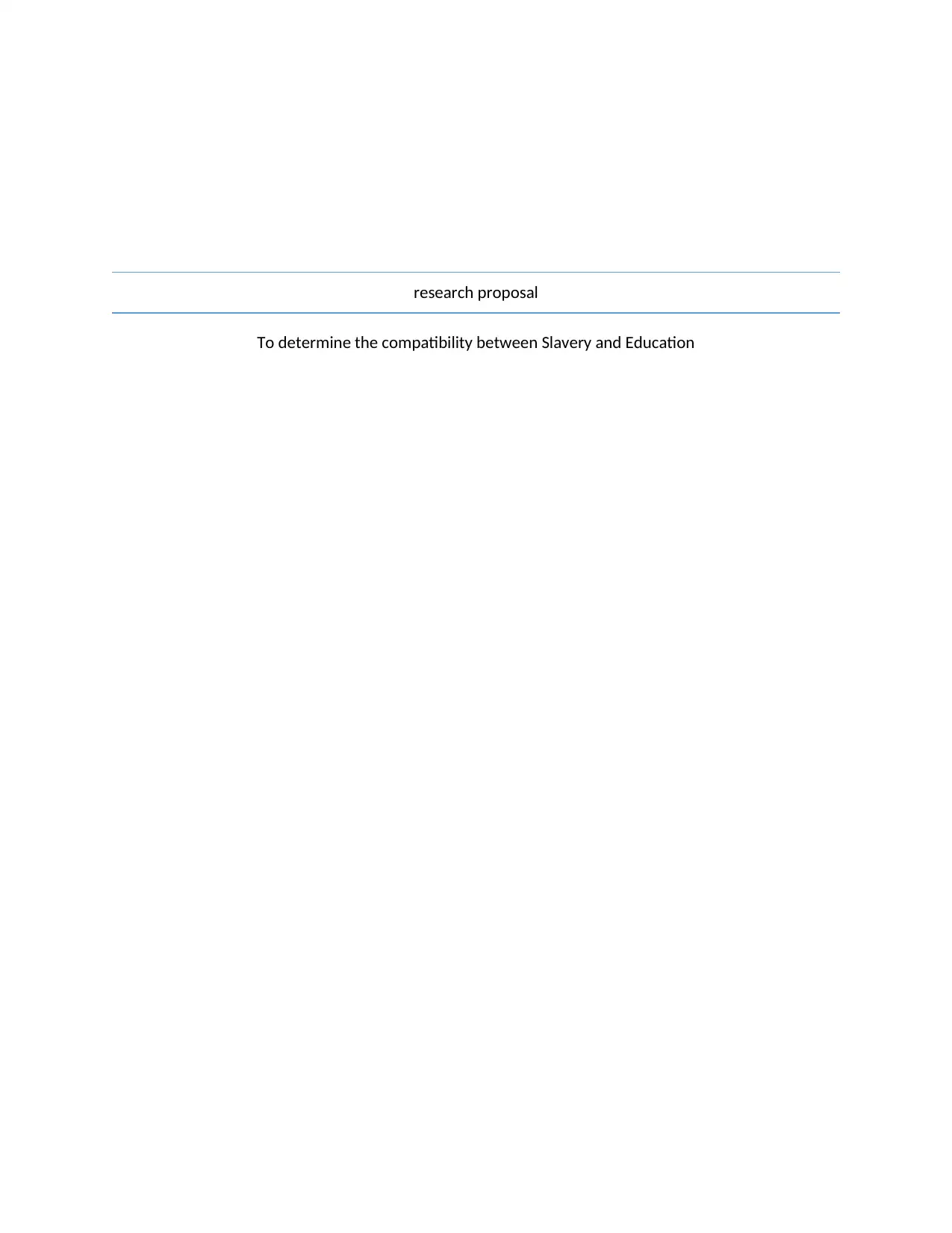
research proposal
To determine the compatibility between Slavery and Education
To determine the compatibility between Slavery and Education
Paraphrase This Document
Need a fresh take? Get an instant paraphrase of this document with our AI Paraphraser
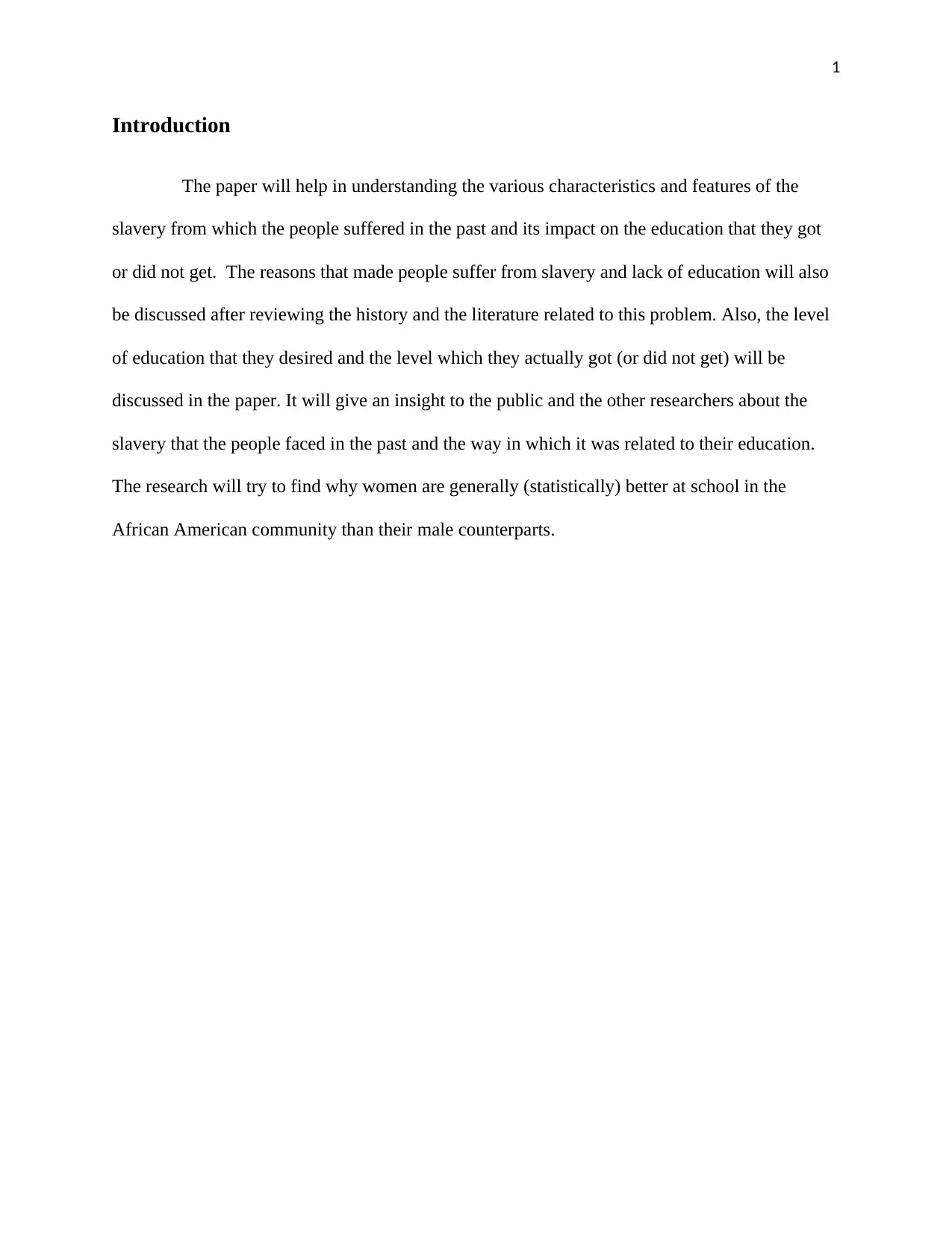
1
Introduction
The paper will help in understanding the various characteristics and features of the
slavery from which the people suffered in the past and its impact on the education that they got
or did not get. The reasons that made people suffer from slavery and lack of education will also
be discussed after reviewing the history and the literature related to this problem. Also, the level
of education that they desired and the level which they actually got (or did not get) will be
discussed in the paper. It will give an insight to the public and the other researchers about the
slavery that the people faced in the past and the way in which it was related to their education.
The research will try to find why women are generally (statistically) better at school in the
African American community than their male counterparts.
Introduction
The paper will help in understanding the various characteristics and features of the
slavery from which the people suffered in the past and its impact on the education that they got
or did not get. The reasons that made people suffer from slavery and lack of education will also
be discussed after reviewing the history and the literature related to this problem. Also, the level
of education that they desired and the level which they actually got (or did not get) will be
discussed in the paper. It will give an insight to the public and the other researchers about the
slavery that the people faced in the past and the way in which it was related to their education.
The research will try to find why women are generally (statistically) better at school in the
African American community than their male counterparts.
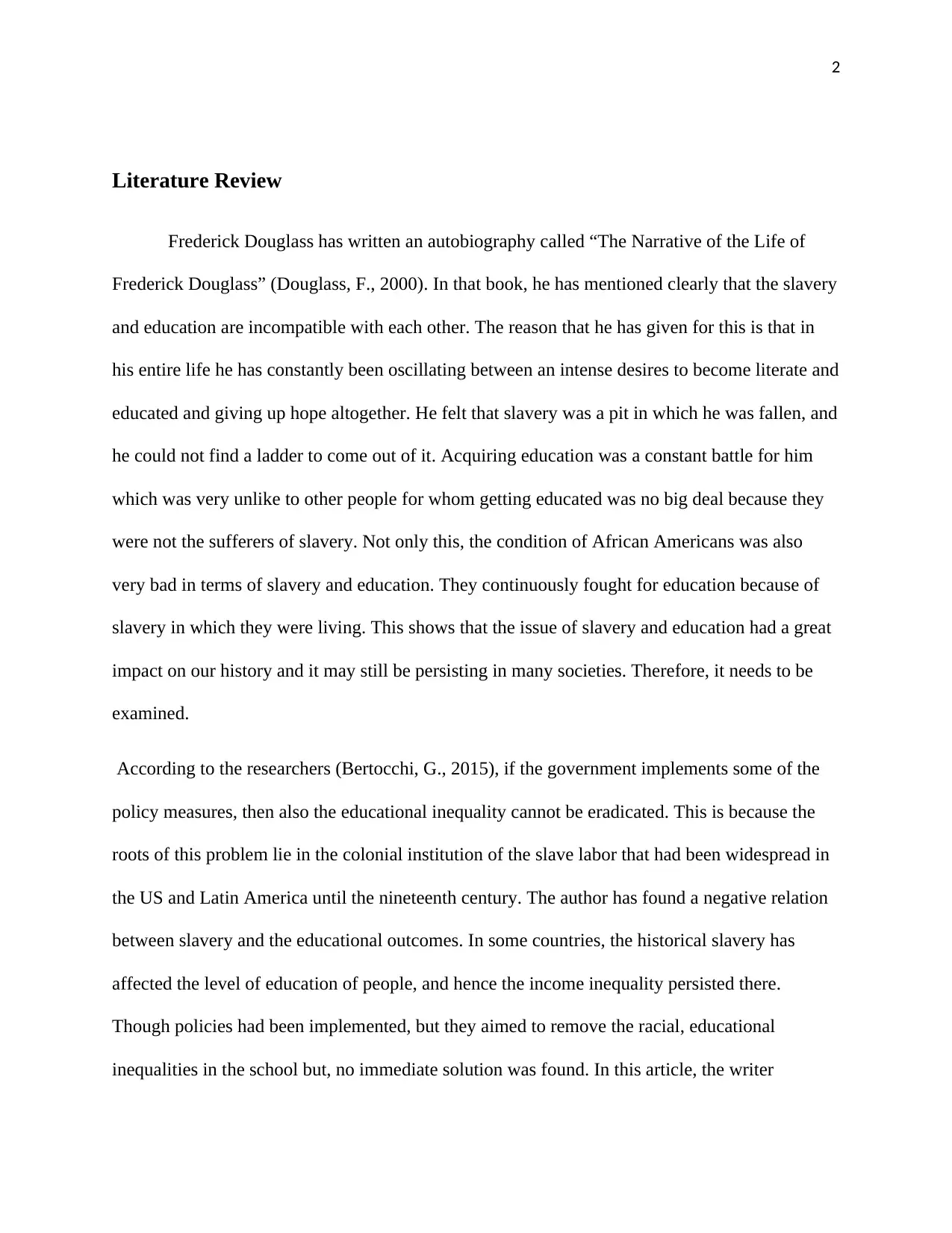
2
Literature Review
Frederick Douglass has written an autobiography called “The Narrative of the Life of
Frederick Douglass” (Douglass, F., 2000). In that book, he has mentioned clearly that the slavery
and education are incompatible with each other. The reason that he has given for this is that in
his entire life he has constantly been oscillating between an intense desires to become literate and
educated and giving up hope altogether. He felt that slavery was a pit in which he was fallen, and
he could not find a ladder to come out of it. Acquiring education was a constant battle for him
which was very unlike to other people for whom getting educated was no big deal because they
were not the sufferers of slavery. Not only this, the condition of African Americans was also
very bad in terms of slavery and education. They continuously fought for education because of
slavery in which they were living. This shows that the issue of slavery and education had a great
impact on our history and it may still be persisting in many societies. Therefore, it needs to be
examined.
According to the researchers (Bertocchi, G., 2015), if the government implements some of the
policy measures, then also the educational inequality cannot be eradicated. This is because the
roots of this problem lie in the colonial institution of the slave labor that had been widespread in
the US and Latin America until the nineteenth century. The author has found a negative relation
between slavery and the educational outcomes. In some countries, the historical slavery has
affected the level of education of people, and hence the income inequality persisted there.
Though policies had been implemented, but they aimed to remove the racial, educational
inequalities in the school but, no immediate solution was found. In this article, the writer
Literature Review
Frederick Douglass has written an autobiography called “The Narrative of the Life of
Frederick Douglass” (Douglass, F., 2000). In that book, he has mentioned clearly that the slavery
and education are incompatible with each other. The reason that he has given for this is that in
his entire life he has constantly been oscillating between an intense desires to become literate and
educated and giving up hope altogether. He felt that slavery was a pit in which he was fallen, and
he could not find a ladder to come out of it. Acquiring education was a constant battle for him
which was very unlike to other people for whom getting educated was no big deal because they
were not the sufferers of slavery. Not only this, the condition of African Americans was also
very bad in terms of slavery and education. They continuously fought for education because of
slavery in which they were living. This shows that the issue of slavery and education had a great
impact on our history and it may still be persisting in many societies. Therefore, it needs to be
examined.
According to the researchers (Bertocchi, G., 2015), if the government implements some of the
policy measures, then also the educational inequality cannot be eradicated. This is because the
roots of this problem lie in the colonial institution of the slave labor that had been widespread in
the US and Latin America until the nineteenth century. The author has found a negative relation
between slavery and the educational outcomes. In some countries, the historical slavery has
affected the level of education of people, and hence the income inequality persisted there.
Though policies had been implemented, but they aimed to remove the racial, educational
inequalities in the school but, no immediate solution was found. In this article, the writer
⊘ This is a preview!⊘
Do you want full access?
Subscribe today to unlock all pages.

Trusted by 1+ million students worldwide
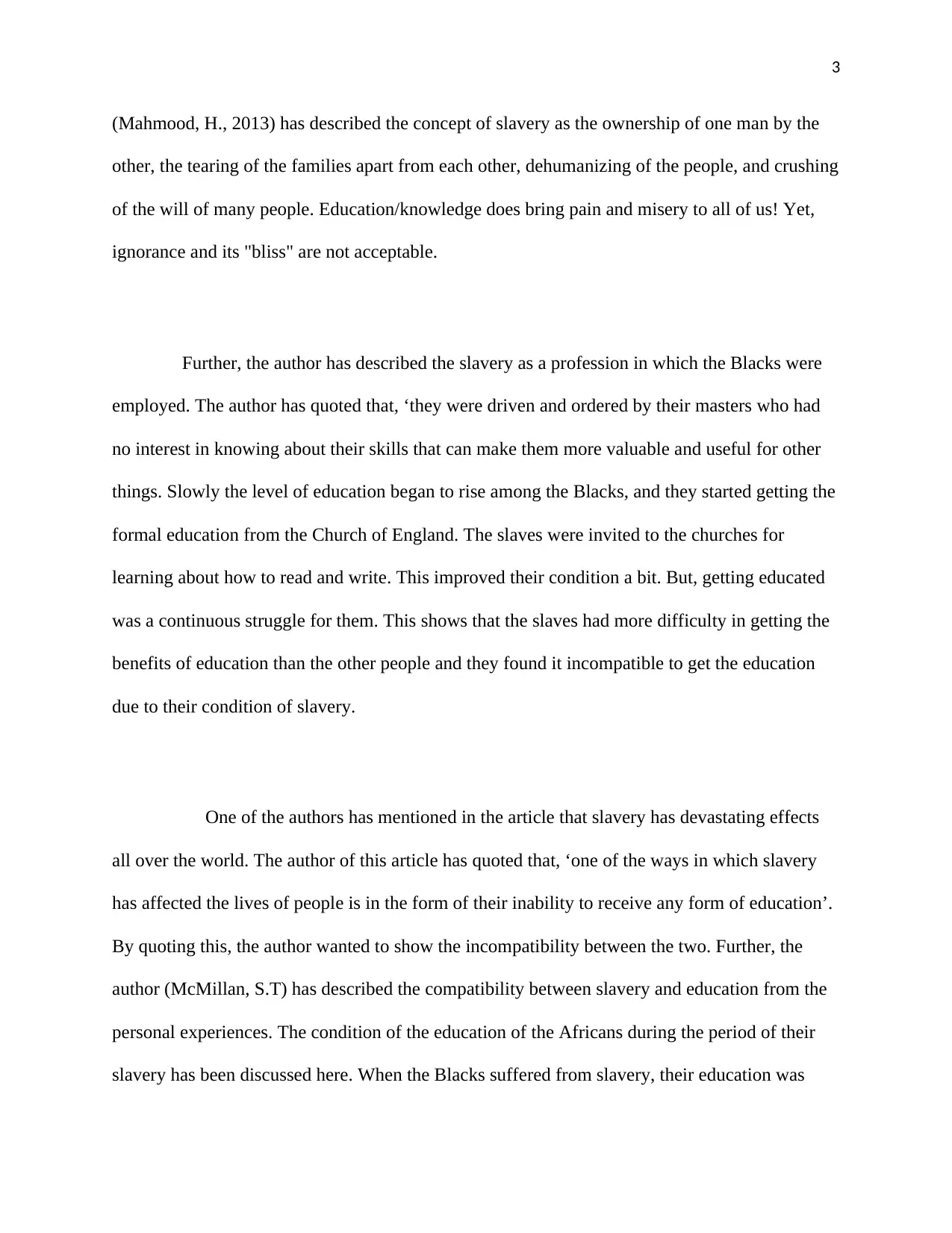
3
(Mahmood, H., 2013) has described the concept of slavery as the ownership of one man by the
other, the tearing of the families apart from each other, dehumanizing of the people, and crushing
of the will of many people. Education/knowledge does bring pain and misery to all of us! Yet,
ignorance and its "bliss" are not acceptable.
Further, the author has described the slavery as a profession in which the Blacks were
employed. The author has quoted that, ‘they were driven and ordered by their masters who had
no interest in knowing about their skills that can make them more valuable and useful for other
things. Slowly the level of education began to rise among the Blacks, and they started getting the
formal education from the Church of England. The slaves were invited to the churches for
learning about how to read and write. This improved their condition a bit. But, getting educated
was a continuous struggle for them. This shows that the slaves had more difficulty in getting the
benefits of education than the other people and they found it incompatible to get the education
due to their condition of slavery.
One of the authors has mentioned in the article that slavery has devastating effects
all over the world. The author of this article has quoted that, ‘one of the ways in which slavery
has affected the lives of people is in the form of their inability to receive any form of education’.
By quoting this, the author wanted to show the incompatibility between the two. Further, the
author (McMillan, S.T) has described the compatibility between slavery and education from the
personal experiences. The condition of the education of the Africans during the period of their
slavery has been discussed here. When the Blacks suffered from slavery, their education was
(Mahmood, H., 2013) has described the concept of slavery as the ownership of one man by the
other, the tearing of the families apart from each other, dehumanizing of the people, and crushing
of the will of many people. Education/knowledge does bring pain and misery to all of us! Yet,
ignorance and its "bliss" are not acceptable.
Further, the author has described the slavery as a profession in which the Blacks were
employed. The author has quoted that, ‘they were driven and ordered by their masters who had
no interest in knowing about their skills that can make them more valuable and useful for other
things. Slowly the level of education began to rise among the Blacks, and they started getting the
formal education from the Church of England. The slaves were invited to the churches for
learning about how to read and write. This improved their condition a bit. But, getting educated
was a continuous struggle for them. This shows that the slaves had more difficulty in getting the
benefits of education than the other people and they found it incompatible to get the education
due to their condition of slavery.
One of the authors has mentioned in the article that slavery has devastating effects
all over the world. The author of this article has quoted that, ‘one of the ways in which slavery
has affected the lives of people is in the form of their inability to receive any form of education’.
By quoting this, the author wanted to show the incompatibility between the two. Further, the
author (McMillan, S.T) has described the compatibility between slavery and education from the
personal experiences. The condition of the education of the Africans during the period of their
slavery has been discussed here. When the Blacks suffered from slavery, their education was
Paraphrase This Document
Need a fresh take? Get an instant paraphrase of this document with our AI Paraphraser
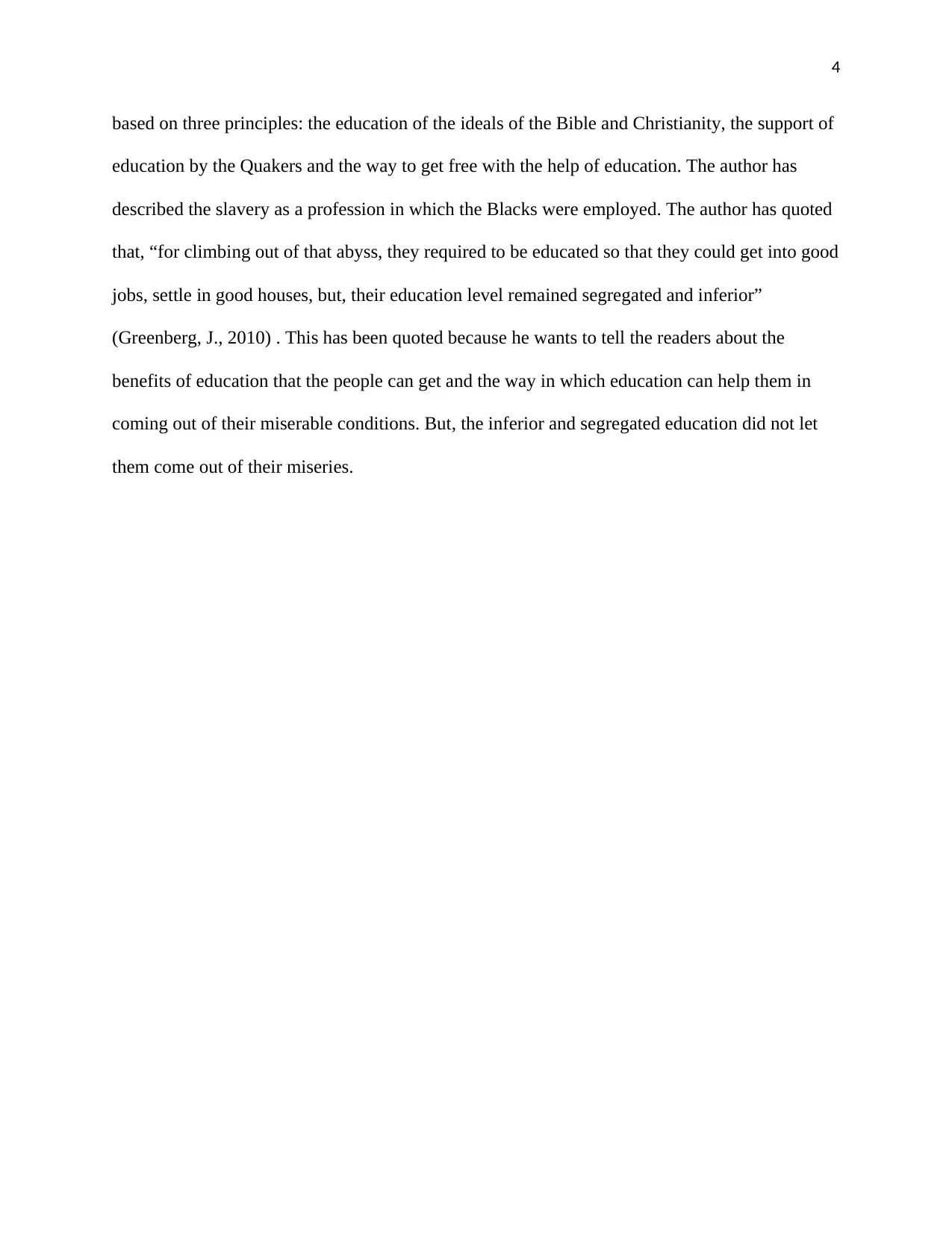
4
based on three principles: the education of the ideals of the Bible and Christianity, the support of
education by the Quakers and the way to get free with the help of education. The author has
described the slavery as a profession in which the Blacks were employed. The author has quoted
that, “for climbing out of that abyss, they required to be educated so that they could get into good
jobs, settle in good houses, but, their education level remained segregated and inferior”
(Greenberg, J., 2010) . This has been quoted because he wants to tell the readers about the
benefits of education that the people can get and the way in which education can help them in
coming out of their miserable conditions. But, the inferior and segregated education did not let
them come out of their miseries.
based on three principles: the education of the ideals of the Bible and Christianity, the support of
education by the Quakers and the way to get free with the help of education. The author has
described the slavery as a profession in which the Blacks were employed. The author has quoted
that, “for climbing out of that abyss, they required to be educated so that they could get into good
jobs, settle in good houses, but, their education level remained segregated and inferior”
(Greenberg, J., 2010) . This has been quoted because he wants to tell the readers about the
benefits of education that the people can get and the way in which education can help them in
coming out of their miserable conditions. But, the inferior and segregated education did not let
them come out of their miseries.
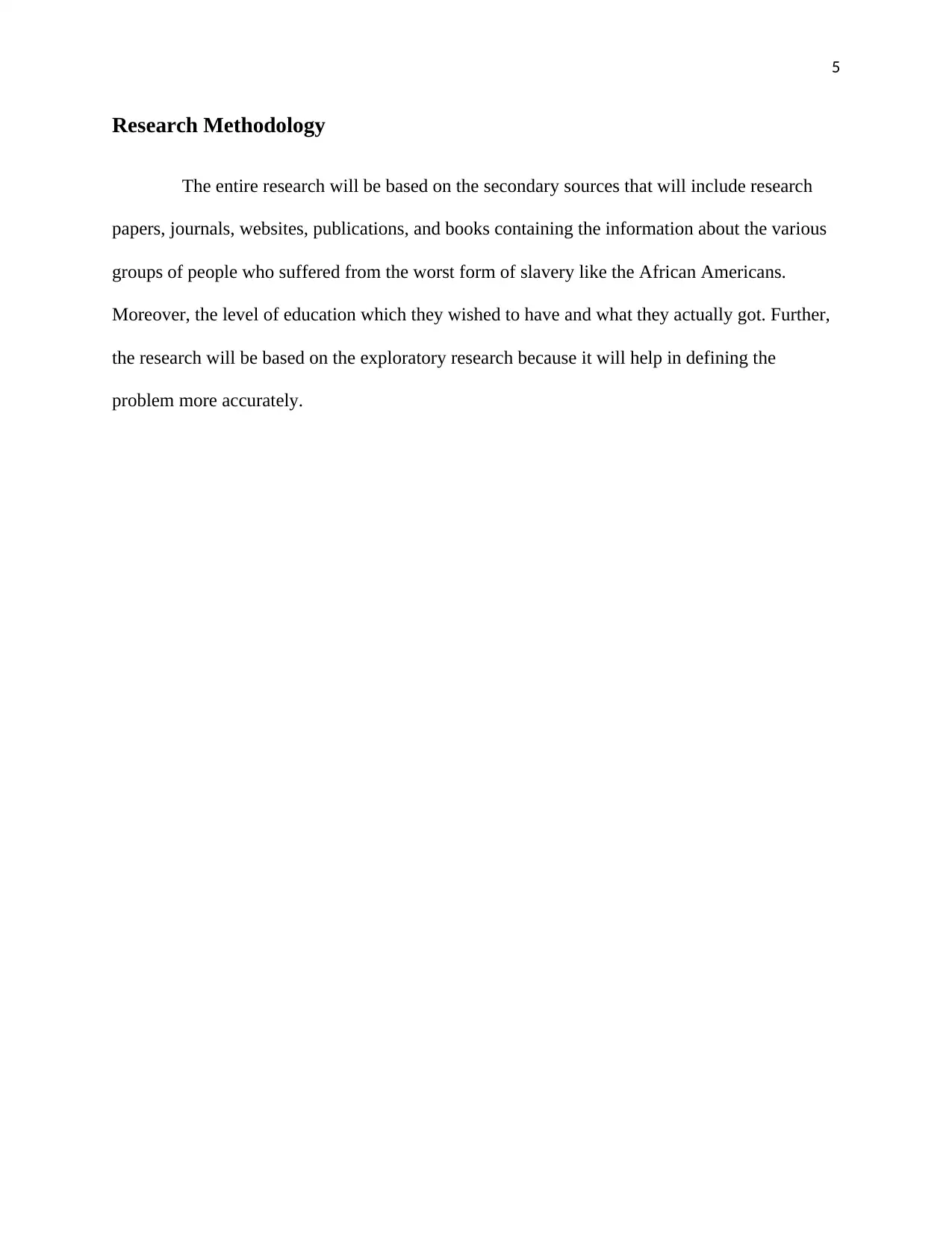
5
Research Methodology
The entire research will be based on the secondary sources that will include research
papers, journals, websites, publications, and books containing the information about the various
groups of people who suffered from the worst form of slavery like the African Americans.
Moreover, the level of education which they wished to have and what they actually got. Further,
the research will be based on the exploratory research because it will help in defining the
problem more accurately.
Research Methodology
The entire research will be based on the secondary sources that will include research
papers, journals, websites, publications, and books containing the information about the various
groups of people who suffered from the worst form of slavery like the African Americans.
Moreover, the level of education which they wished to have and what they actually got. Further,
the research will be based on the exploratory research because it will help in defining the
problem more accurately.
⊘ This is a preview!⊘
Do you want full access?
Subscribe today to unlock all pages.

Trusted by 1+ million students worldwide
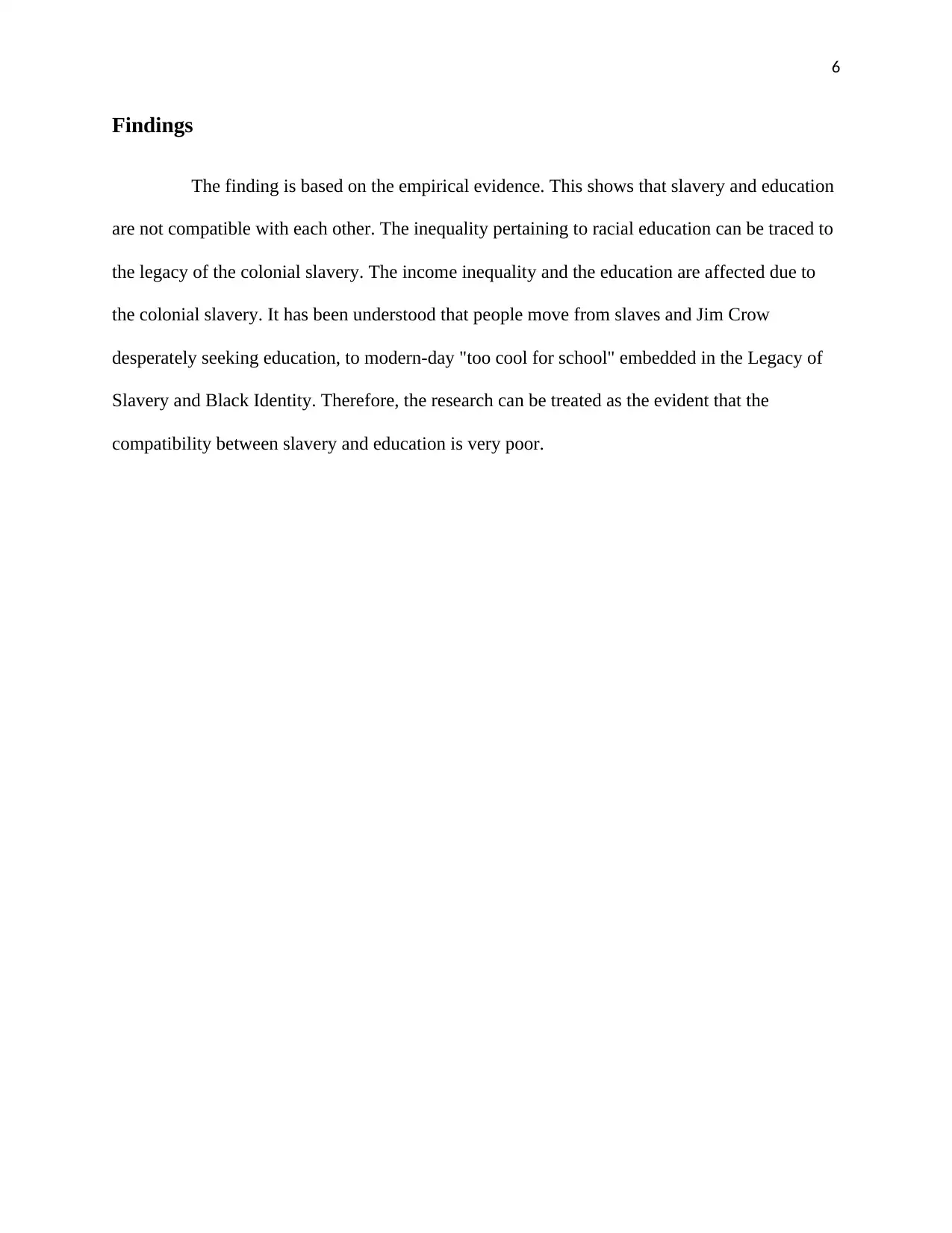
6
Findings
The finding is based on the empirical evidence. This shows that slavery and education
are not compatible with each other. The inequality pertaining to racial education can be traced to
the legacy of the colonial slavery. The income inequality and the education are affected due to
the colonial slavery. It has been understood that people move from slaves and Jim Crow
desperately seeking education, to modern-day "too cool for school" embedded in the Legacy of
Slavery and Black Identity. Therefore, the research can be treated as the evident that the
compatibility between slavery and education is very poor.
Findings
The finding is based on the empirical evidence. This shows that slavery and education
are not compatible with each other. The inequality pertaining to racial education can be traced to
the legacy of the colonial slavery. The income inequality and the education are affected due to
the colonial slavery. It has been understood that people move from slaves and Jim Crow
desperately seeking education, to modern-day "too cool for school" embedded in the Legacy of
Slavery and Black Identity. Therefore, the research can be treated as the evident that the
compatibility between slavery and education is very poor.
Paraphrase This Document
Need a fresh take? Get an instant paraphrase of this document with our AI Paraphraser
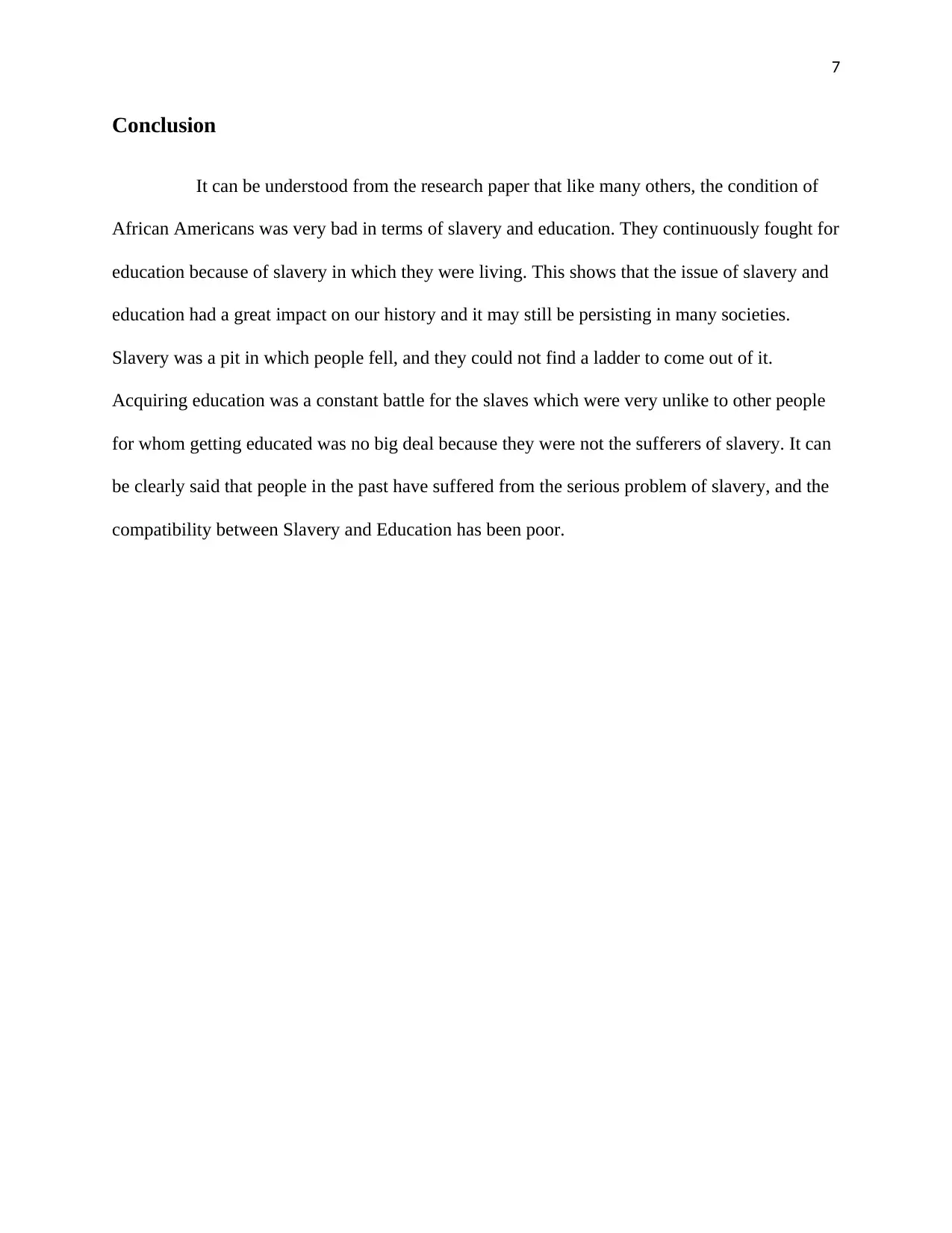
7
Conclusion
It can be understood from the research paper that like many others, the condition of
African Americans was very bad in terms of slavery and education. They continuously fought for
education because of slavery in which they were living. This shows that the issue of slavery and
education had a great impact on our history and it may still be persisting in many societies.
Slavery was a pit in which people fell, and they could not find a ladder to come out of it.
Acquiring education was a constant battle for the slaves which were very unlike to other people
for whom getting educated was no big deal because they were not the sufferers of slavery. It can
be clearly said that people in the past have suffered from the serious problem of slavery, and the
compatibility between Slavery and Education has been poor.
Conclusion
It can be understood from the research paper that like many others, the condition of
African Americans was very bad in terms of slavery and education. They continuously fought for
education because of slavery in which they were living. This shows that the issue of slavery and
education had a great impact on our history and it may still be persisting in many societies.
Slavery was a pit in which people fell, and they could not find a ladder to come out of it.
Acquiring education was a constant battle for the slaves which were very unlike to other people
for whom getting educated was no big deal because they were not the sufferers of slavery. It can
be clearly said that people in the past have suffered from the serious problem of slavery, and the
compatibility between Slavery and Education has been poor.
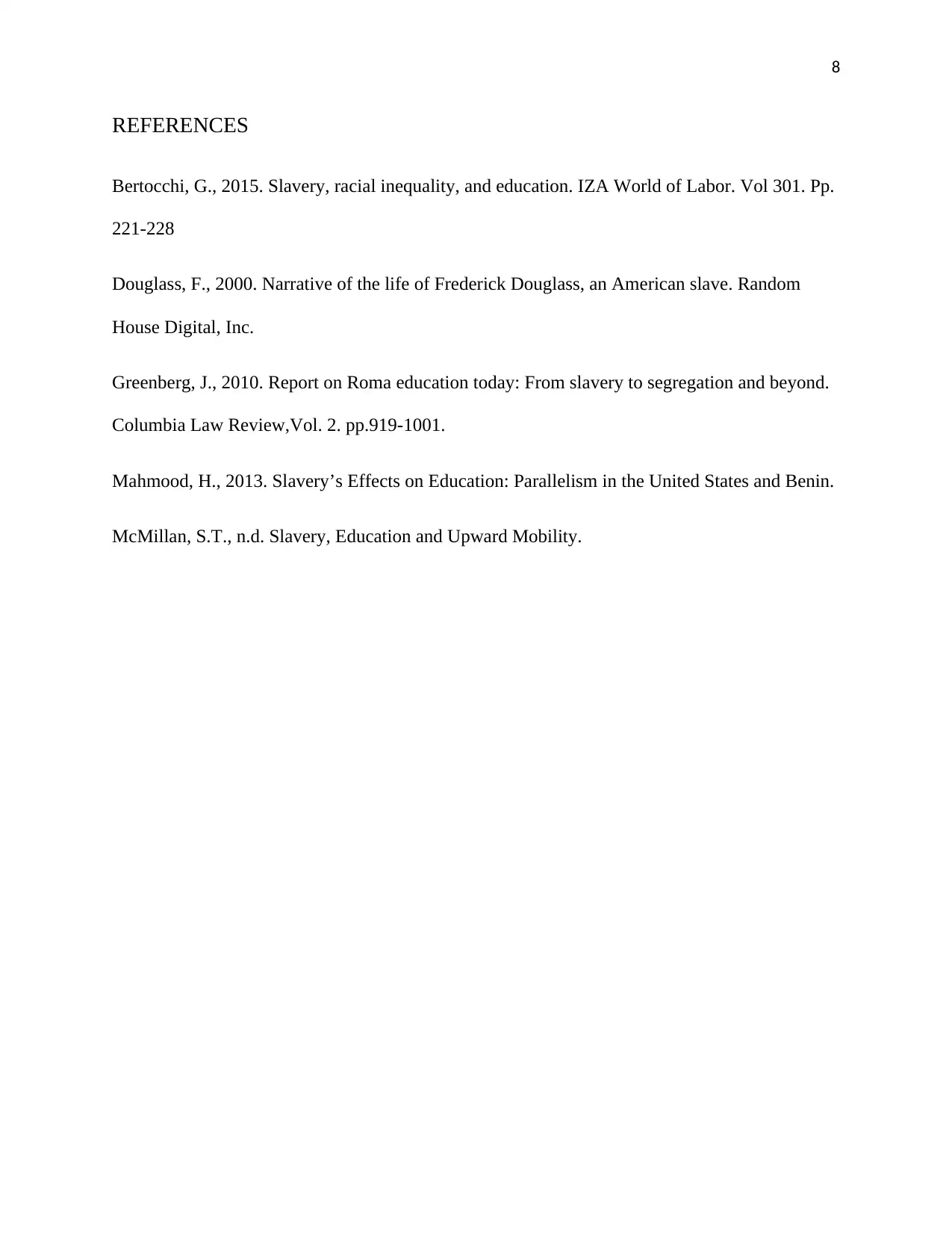
8
REFERENCES
Bertocchi, G., 2015. Slavery, racial inequality, and education. IZA World of Labor. Vol 301. Pp.
221-228
Douglass, F., 2000. Narrative of the life of Frederick Douglass, an American slave. Random
House Digital, Inc.
Greenberg, J., 2010. Report on Roma education today: From slavery to segregation and beyond.
Columbia Law Review,Vol. 2. pp.919-1001.
Mahmood, H., 2013. Slavery’s Effects on Education: Parallelism in the United States and Benin.
McMillan, S.T., n.d. Slavery, Education and Upward Mobility.
REFERENCES
Bertocchi, G., 2015. Slavery, racial inequality, and education. IZA World of Labor. Vol 301. Pp.
221-228
Douglass, F., 2000. Narrative of the life of Frederick Douglass, an American slave. Random
House Digital, Inc.
Greenberg, J., 2010. Report on Roma education today: From slavery to segregation and beyond.
Columbia Law Review,Vol. 2. pp.919-1001.
Mahmood, H., 2013. Slavery’s Effects on Education: Parallelism in the United States and Benin.
McMillan, S.T., n.d. Slavery, Education and Upward Mobility.
⊘ This is a preview!⊘
Do you want full access?
Subscribe today to unlock all pages.

Trusted by 1+ million students worldwide
1 out of 9
Related Documents
Your All-in-One AI-Powered Toolkit for Academic Success.
+13062052269
info@desklib.com
Available 24*7 on WhatsApp / Email
![[object Object]](/_next/static/media/star-bottom.7253800d.svg)
Unlock your academic potential
Copyright © 2020–2025 A2Z Services. All Rights Reserved. Developed and managed by ZUCOL.





